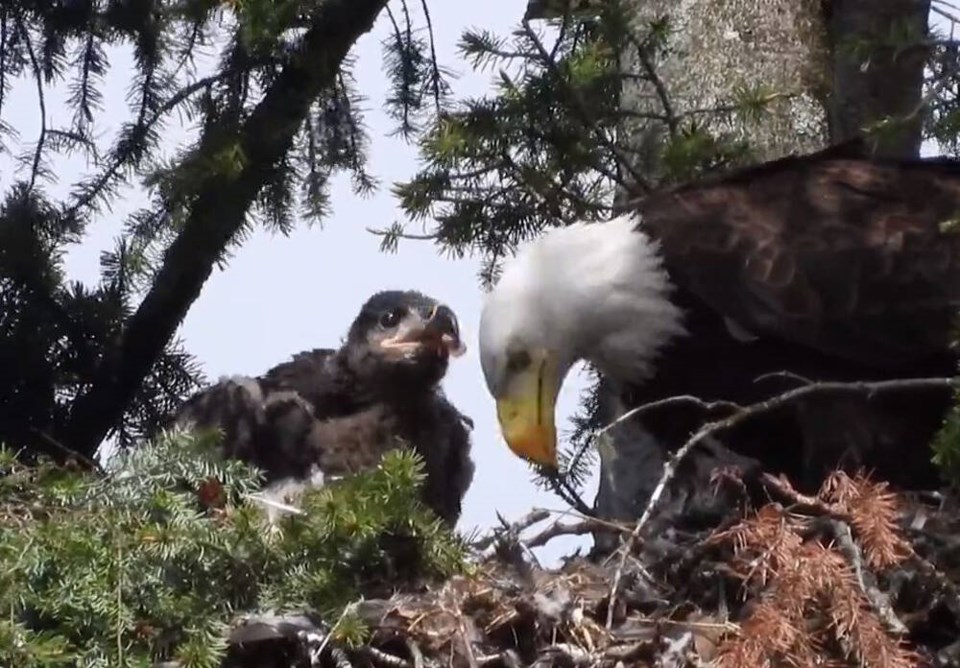About two thirds of North Vancouver and West Vancouver’s known eagle nests have chicks in them this spring, according to North Shore Eagle Network – potentially a good sign for the species locally.
There are 21 known mated pairs of eagles on the North Shore, and volunteer monitors for the network have confirmed 17 chicks as of May 15.
In past years, as many as 90 per cent of the eagle pairs on the North Shore had chicks, but in 2022 there was a startling drop-off with just 13 hatched and only five fledged.
It’s still not known exactly why 2022 was such a down year, but avian flu is the prime suspect. Other environmental concerns may have been factors as well, including the 2021 heat dome or atmospheric river, which could have impacted the birds and the salmon they feed on.
In any case, the volunteers are glad to see the number trending upward again.
“It’s better than last year,” said Sally McDermott, co-ordinator for the network. “Everybody’s optimistic.”
The numbers tend to fluctuate at this time of year, in part because some chicks don’t survive their first few weeks, while other times, the monitors will spot another little head pop up in a nest where they previously only confirmed one.
This year’s chicks are now between four and six weeks old – about half way to the age at which they’ll fledge and learn to hunt on their own.
“They’ve gone from the white fuzzball to the grey fuzzball. Now they’re starting to get a bit of brown,” McDermott said. “They’re eating a lot more so the parents are having to bring a lot more food in…. They’re standing. They’re more alert. They’re looking out.”
2023 05 18 Ambleside Nest two Chicks from ECeaglevideo on Vimeo.
At this age, there’s some risk of the chicks falling from the nest. If they survive, McDermott said it’s best to leave them where they are, as chicks have been known to make their way back up through the branches. They should also be reported to the Orphaned Wildlife Rehabilitation Society or OWL, which knows how to care for them. They can be reached at 604-946-3171.
If you find a dead chick or eagle, don’t touch it with your bare hands. Instead, report it to the province, which is monitoring for signs of avian flu, at 1-866-431-BIRD (2473).
Eagles are famously territorial, and Metro Vancouver may be at “maximum capacity,” according to eagle expert David Hancock. When new out-of-town eagles show up, they are liable to end up in fights over turf with current residents. That’s what happened last year with an eagle who nests near Lighthouse Park. Annie, as she became known, was rescued by the network’s volunteers and OWL, and later was fitted by the Hancock Wildlife Foundation with a backpack-like tracker device that allows us to see her location in real time.
Annie has two chicks in her care this spring. Normally she keeps to the nest and her hunting grounds off West Grebe Islet, but she recently made a couple unexplained sojourns to the Vancouver Landfill in Delta.
The best things that humans on the ground can do to support eagles is make sure they are given plenty of space and keep their habitats protected, McDermott said, which is best done by having plenty of watchful eyes out. The monitors train their lenses and webcams at each of the known nests to keep tabs on the adults and their chicks, which is easier said than done.
The group is always looking for more monitors to help, but McDermott warned, volunteers tend to become rather attached. It makes it’s all the more difficult when one of the chicks doesn’t make it, she said.
“It’s life,” she said.
2023 05 21 Inter River Eagle Nest F from ECeaglevideo on Vimeo.



